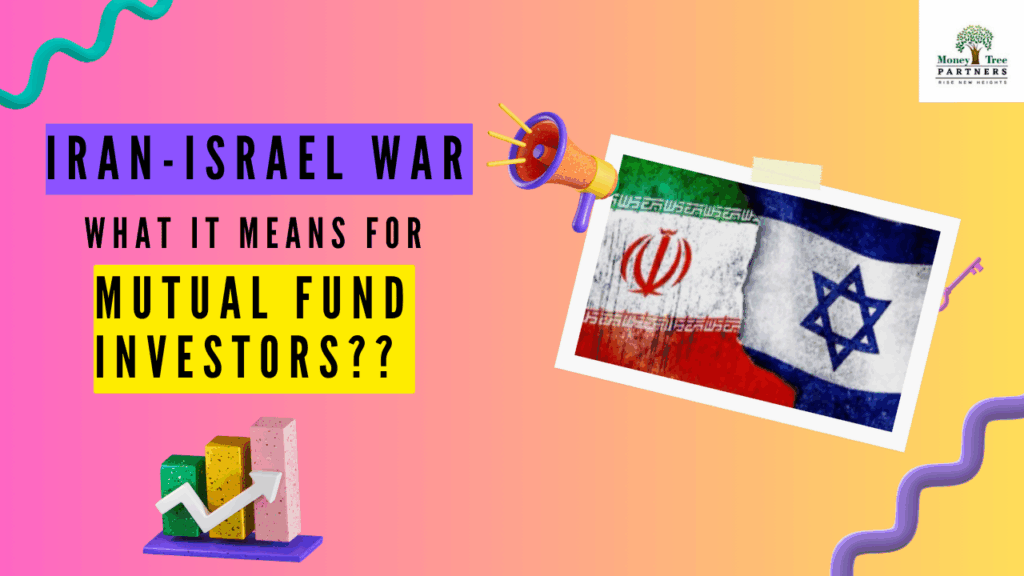
Recently, tensions between Iran and Israel have intensified, raising significant concerns not only regarding geopolitics but also concerning global economies and financial markets. For Indian investors, particularly those involved in mutual funds, it is crucial to comprehend how such international disputes can affect stock markets in India, and what actions should be taken during these uncertain times.
Let us analyze the implications of the Iran-Israel conflict for India, the associated market risks, and the mutual fund strategies that should be considered.
What is Occurring Between Iran and Israel?
The tension between Iran and Israel is not a recent development; however, in 2024–25, it escalated dramatically with direct assaults and military responses. Israel has accused Iran of providing support to armed factions near its borders, while Iran has charged Israel with targeting its vital installations. This conflict has now escalated to a level where missile strikes, drone assaults, and military threats have become commonplace.
As the situation continues to evolve, conflicts in the Middle East invariably have global repercussions due to the region’s significance for oil supply and international trade routes.
How It Affects Indian Markets
Even though India is not directly involved, its economy and stock markets are significantly influenced due to global interdependence.
1. Stock Market Volatility
The Sensex and Nifty typically respond sharply to international conflicts. Investors often engage in panic selling driven by fear, resulting in abrupt declines in stock prices. Foreign Institutional Investors (FIIs) frequently withdraw funds from emerging markets such as India during these occurrences.
2. Crude Oil Prices Surge
Iran is a key oil-producing nation. Any unrest in the region affects global crude oil prices. Given that India imports over 80% of its crude oil, escalating prices lead to increased inflation and impact companies that are heavily dependent on oil (e.g., transportation, aviation, paints, etc.).
3. Weak Rupee
As oil prices escalate, the Indian rupee often depreciates against the US dollar. A weaker rupee renders imports more costly and can result in current account deficits, which further burdens the economy.
Impact on Mutual Funds in India
1. Equity Mutual Funds
Funds that allocate investments in sectors such as banking, manufacturing, oil & gas, automotive, and FMCG may experience short-term losses. Small-cap and mid-cap funds are generally more susceptible to volatility during periods of global tension.
2. Debt Mutual Funds
These funds are influenced by fluctuations in interest rates, inflation expectations, and bond yields. In times of global uncertainty, investors tend to favor safer assets like government bonds, which may temporarily benefit short-duration and gilt funds.
3. International Mutual Funds
Any fund with exposure to international equities (particularly in the Middle East or the US) may experience heightened volatility. Gold ETFs and gold-linked funds often perform favorably during geopolitical tensions as gold is regarded as a “safe haven.”
What Should Mutual Fund Investors Do?
The most crucial advice: Remain calm. Wars and geopolitical tensions may cause temporary disruptions, yet markets generally rebound over time. Here are some actions you can take:
1. Adhere to Your Financial Objectives
If your investments are aimed at long-term goals (such as retirement or your child’s education), it is advisable to maintain your investment. Market downturns can present buying opportunities for SIP investors.
2. Persist with Your SIPs
Systematic Investment Plans (SIPs) are structured to capitalize on market fluctuations. When NAVs decrease, you acquire more units for the same investment amount, enhancing long-term returns.
3. Broaden Your Portfolio
Ensure that your portfolio is diversified with a combination of equity, debt, and gold. Incorporate gold mutual funds or gold ETFs as a safeguard against geopolitical risks.
4. Refrain from Market Timing
Anticipating market peaks and troughs during wartime is nearly unfeasible. It is more prudent to remain invested and reassess your asset allocation rather than withdrawing out of fear.
LONG-TERM OUTLOOK
Historically, markets have bounced back from wars — including the Russia-Ukraine conflict, US-Iran tensions, and crises in the Middle East. The economic fundamentals of India remain robust, and provided that the conflict does not escalate into a broader war involving additional nations, Indian markets are projected to stabilize over time.
CONCLUSION
Although the conflict between Iran and Israel is significant and its repercussions are evident in global financial markets, succumbing to panic is not a viable solution. Investors in Indian mutual funds ought to concentrate on long-term wealth accumulation, uphold discipline, and assess their portfolios with the guidance of a reliable financial advisor.
Historical trends indicate that markets tend to recover — and likewise, your confidence in your investments should also be restored.
FAQs
1. Should I stop my SIPs during the Iran-Israel war?
No. Stopping SIPs during market dips can reduce long-term returns. SIPs help you average out costs during volatile times. If you are investing with long-term goals in mind, continue your SIPs.
2. Will Indian mutual funds recover after the Iran-Israel conflict ends?
Most likely, yes. Indian mutual funds have shown resilience in the past. Market dips due to war tend to be temporary, and long-term investors usually benefit from staying invested.
3. Which mutual funds are safer during geopolitical tension?
- Debt mutual funds with short duration (low interest rate risk).
- Gold ETFs and gold funds, as gold prices usually rise during global crises.
- Balanced advantage funds that adjust asset allocation automatically.

